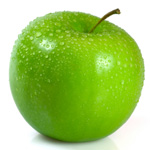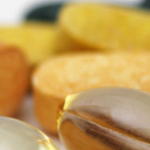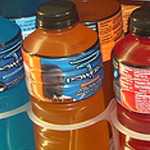How Following The Calendar And Nutrition Plan Makes A Difference With Insanity
Too many people think that the Insanity Workout is all about going 110% and little more. They think that if you throw yourself into the [...]
Too many people think that the Insanity Workout is all about going 110% and little more. They think that if you throw yourself into the [...]
The default move when people want to get into shape is to go to the gym. They don't even think about it, instead equating a [...]
The perennial question is: how do you lose weight and keep it off? How do you avoid the yo-yo swings that everybody seems to go [...]
 We've all been there. Sunday afternoon at a poolside BBQ, looking good, feeling good, body in the best shape it's ever been, a month or so into your new workout regimen, and suddenly somebody shoves a paper plate loaded with potato salad, grilled sausages oozing fat, a pile of potato chips, whatever. Or maybe it's the day of a big game, and your buddy is serving up six fresh pizzas along with soda. Or you're driving home late, you're exhausted, and you decide to just hit a Drive Through and pick up some junk food to go. Either way, everybody ultimately gets tempted to break their nutrition plan and eat junk. Accept that this will happen to you, accept that you'll be tempted, and then ask the question you'll immediately ask as you look down at that unhealthy food: how bad is one cheat day?
We've all been there. Sunday afternoon at a poolside BBQ, looking good, feeling good, body in the best shape it's ever been, a month or so into your new workout regimen, and suddenly somebody shoves a paper plate loaded with potato salad, grilled sausages oozing fat, a pile of potato chips, whatever. Or maybe it's the day of a big game, and your buddy is serving up six fresh pizzas along with soda. Or you're driving home late, you're exhausted, and you decide to just hit a Drive Through and pick up some junk food to go. Either way, everybody ultimately gets tempted to break their nutrition plan and eat junk. Accept that this will happen to you, accept that you'll be tempted, and then ask the question you'll immediately ask as you look down at that unhealthy food: how bad is one cheat day?
 I get this question all the time. "I'm doing everything right," they say. "How come I'm not losing more weight?" Whether it's somebody who has been pounding away at Insanity for a couple of weeks, or who's about to finish their first round of P90X, people will often climb onto that dreaded scale and get disheartened. Expectations run high when people start, and yearning for a total body transformation, they pour their heart and soul into their workouts, only to find themselves betrayed when they haven't dropped the 50lbs they hoped to lose. What's happening here? What went wrong, and why?
I get this question all the time. "I'm doing everything right," they say. "How come I'm not losing more weight?" Whether it's somebody who has been pounding away at Insanity for a couple of weeks, or who's about to finish their first round of P90X, people will often climb onto that dreaded scale and get disheartened. Expectations run high when people start, and yearning for a total body transformation, they pour their heart and soul into their workouts, only to find themselves betrayed when they haven't dropped the 50lbs they hoped to lose. What's happening here? What went wrong, and why?
 People start new programs all the time, and people quit them just as fast. For every ten bright eyed, enthusiastic newbies ready to start their latest fitness endeavour, there are nine burnt out, hollow eyed folks who failed to go the distance. What's that one person doing right, that those nine people are failing to do? How do you line up your factors so that you're most likely to stick with your workout, and less likely to quit? If you've glanced at the banner above, you're likely to have an idea as to where I'm going, but listen up folks. Sometimes its the basics that people forget first.
People start new programs all the time, and people quit them just as fast. For every ten bright eyed, enthusiastic newbies ready to start their latest fitness endeavour, there are nine burnt out, hollow eyed folks who failed to go the distance. What's that one person doing right, that those nine people are failing to do? How do you line up your factors so that you're most likely to stick with your workout, and less likely to quit? If you've glanced at the banner above, you're likely to have an idea as to where I'm going, but listen up folks. Sometimes its the basics that people forget first.
 Go to the supermarket and you will see a hundred thousand bazillion bottles of vitamin supplements staring down at you from countless shelves. Vitamins A, B, C, D and the rest of the alphabet. Have you ever asked yourself where these vitamins come from? If you've pictured a Willy Wonka style factory where Umpa Loompa's squeeze Vitamin C from orange slices and harvest Vitamin D from the sun, then you couldn't be more wrong. In fact, vitamins are chemically synthesized from such horrendous things as mineral ores, fungi, petroleum and bacteria. The process creates a terrible amount of pollution, and until recently was overseen by a price fixing cartel that was only taken down in 1999. Vitamins: good for you, not so good for the world?
Go to the supermarket and you will see a hundred thousand bazillion bottles of vitamin supplements staring down at you from countless shelves. Vitamins A, B, C, D and the rest of the alphabet. Have you ever asked yourself where these vitamins come from? If you've pictured a Willy Wonka style factory where Umpa Loompa's squeeze Vitamin C from orange slices and harvest Vitamin D from the sun, then you couldn't be more wrong. In fact, vitamins are chemically synthesized from such horrendous things as mineral ores, fungi, petroleum and bacteria. The process creates a terrible amount of pollution, and until recently was overseen by a price fixing cartel that was only taken down in 1999. Vitamins: good for you, not so good for the world?
 t's hard not to think we're sliding into a nutrition-version of 1984. I saw Food Inc this weekend. Shocked and angered me. I've been learning a lot about nutrition and what's healthy and what's not over the past, year, so I don't consider myself a newbie when it comes to these issues, but to see everything put together so lucidly and for the facts to be stated so blunty was a frightening eye opener.
t's hard not to think we're sliding into a nutrition-version of 1984. I saw Food Inc this weekend. Shocked and angered me. I've been learning a lot about nutrition and what's healthy and what's not over the past, year, so I don't consider myself a newbie when it comes to these issues, but to see everything put together so lucidly and for the facts to be stated so blunty was a frightening eye opener.
 When it comes to post-exercise habits, sports nutrition is concerned with various things: glycogen replenishment, enhancing your body's recovery and adaption to your training, and re-hydration. If you take a look at any supermarket shelf, you'll see scores of energy drinks, recovery drinks, and sports drinks, each more fantastically colored then the next, and all of them promising to turn you into the next athletic superstar if you just drink them. Which is best? Is classic water better, or milk, or do Powerade and Gatorade really hold the secret to optimal re-hydration?
When it comes to post-exercise habits, sports nutrition is concerned with various things: glycogen replenishment, enhancing your body's recovery and adaption to your training, and re-hydration. If you take a look at any supermarket shelf, you'll see scores of energy drinks, recovery drinks, and sports drinks, each more fantastically colored then the next, and all of them promising to turn you into the next athletic superstar if you just drink them. Which is best? Is classic water better, or milk, or do Powerade and Gatorade really hold the secret to optimal re-hydration?
 The consumption of fats has been a controversial topic ever since the American Heart Association linked it to heart disease in the 1950’s. At first all fats were condemned, and then only saturated fat, and today we have a host of different guidelines, ranging for urgings to consume healthy omega-3’s to the avoidance of all red meats. One of the most popular oils and sources of fat are polyunsaturated fats, which can naturally be found in nuts, seeds, fish, algae, leafy greens and krill. However, by the far the greatest source of PUFA’s in most American diets come from vegetable oils such as canola and sunflower oil. People consume these oils in great quantities—but is this a good idea?
The consumption of fats has been a controversial topic ever since the American Heart Association linked it to heart disease in the 1950’s. At first all fats were condemned, and then only saturated fat, and today we have a host of different guidelines, ranging for urgings to consume healthy omega-3’s to the avoidance of all red meats. One of the most popular oils and sources of fat are polyunsaturated fats, which can naturally be found in nuts, seeds, fish, algae, leafy greens and krill. However, by the far the greatest source of PUFA’s in most American diets come from vegetable oils such as canola and sunflower oil. People consume these oils in great quantities—but is this a good idea?